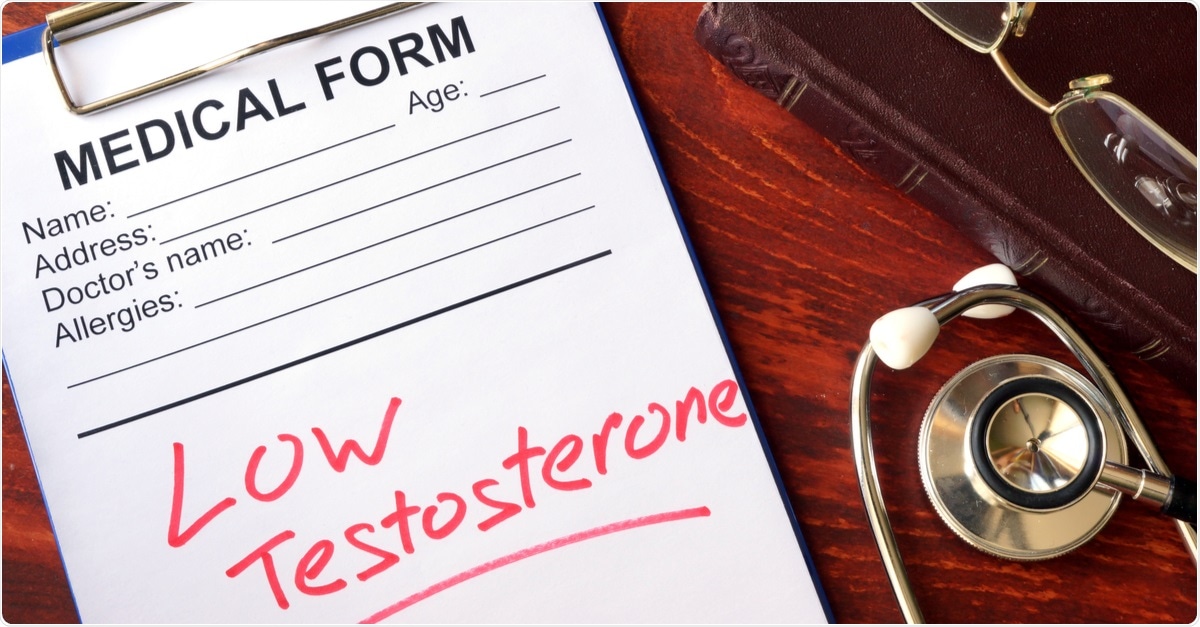The coronavirus disease 2019 (COVID-19) is caused by severe acute respiratory syndrome coronavirus 2 (SARS-CoV-2). It was declared a global pandemic by the World Health Organization (WHO) in March 2020. To date, there have been over 65.3 million confirmed cases of COVID-19 and over 1.51 million deaths across the globe.
COVID-19 can cause flu-like symptoms in infected people, and can present in mild to severe forms. In severe cases, patients can experience acute respiratory distress syndrome (ARDS), which can lead to life-threatening pneumonia, multi-organ failure, septic shock, and death.

Is there a link between testosterone levels and severe COVID-19?
In a recent article published in the journal Medical Hypotheses, researchers from the USA and Saudi Arabia described the direct correlation between testosterone levels, inflammatory cytokines, disease progression, and worse outcomes in male COVID-19 patients.
The route of SARS-CoV-2 is viral entry is via the mucosal membranes, where it enters the alveolar epithelial cells using the angiotensin-converting enzyme II (ACE-2) receptors and TMPRSS2. ACE-2 receptors play a key role in pulmonary protection and viral binding to these receptors deregulates the lung-protective pathway. As ACE-2 is also expressed in the Leydig cells of the testis as a constitutive product, this affects the secretion of testosterone in male COVID-19 patients.
TMPRSS2 is a well-known target of androgen receptor, the activation of which increases TMPRSS2 levels in many tissues. TMPRSS2 expression is significantly higher in the lungs of males compared to that in females.
Low testosterone levels promote the ACE-2 receptor upregulation and viral entry
Testosterone modulates the immune response, and hence the low serum testosterone impacts biological markers negatively. COVID-19 patients with low testosterone levels have reportedly developed severe symptoms requiring ventilator support because of the ACE-2 receptor upregulation in respiratory cells, elevated risk of lung damage, and respiratory muscle catabolism.
Typically, males have about 7–8 times higher levels of testosterone compared to females. Studies have already shown that COVID-19 affects men significantly more than it affects women. The death rate in male COVID-19 patients is twice that in female COVID-19 patients. As discussed earlier, lower testosterone levels lead to the upregulation of ACE2 and TMPRSS2 host receptors, which facilitate the entry of SARS-CoV-2 into the alveolar cells, thus deregulating a lung-protective pathway.
Lower serum testosterone level is a poor prognostic indicator for patients with COVID-19 by deregulating pulmonary protective pathways.”
Decreased testosterone levels in critically ill male patients negatively affect the functioning of endothelial cells and promote a faulty immune response. It also affects the ability to clear the virus and endorse systemic inflammation. Thus, decreased levels of serum testosterone is a poor prognostic indicator for male patients with COVID-19 as it deregulates pulmonary protective pathways.
Based on these findings, the authors hypothesize that low testosterone levels directly correlate with disease severity and worse clinical outcome in male COVID-19 patients.
Obesity in male patients also promotes the production of more pro-inflammatory cytokines that play a key role in cell signaling, causing increased vulnerability and severe disease and clinical outcomes.
High testosterone levels can cause thrombosis, making testosterone a “double-edged sword”
Many studies have reported the correlation between the gradual decrease in testosterone levels and serious pulmonary complications leading to ICU admission, assisted ventilation, and worse disease outcomes. On the other hand, high testosterone levels are said to result in thrombosis, which is another deadly manifestation in COVID-19 patients. This makes a critical evaluation of the serum testosterone levels and its relevance in COVID-19 disease progression crucial in order to re-evaluate treatment strategies. This will help in effectively triaging and prioritizing high-risk patients for ICU admission and targeted treatments.
Keeping in mind the increased risk of male COVID-19 patients face for severe disease and worse outcomes compared to female patients, modes of treatment and vaccine development efforts can be targeted to transcriptionally inhibit ACE-2 and TMPRSS2 expression. Down-regulation of TMPRSS2 will lead to impaired S protein priming, which reduces the interaction of SARS-CoV-2 with ACE-2 receptors, and blocks viral entry.
The role of testosterone screening, optimal pharmacotherapeutic administration of DHEA, and hormone replacement therapy needs to be considered to minimize the pulmonary syndrome and severity of COVID-19.”
"severe" - Google News
December 04, 2020 at 07:28PM
https://ift.tt/3mFDzPK
Low testosterone can increase risk of severe COVID-19 in males - News-Medical.Net
"severe" - Google News
https://ift.tt/2OrY17E
Shoes Man Tutorial
Pos News Update
Meme Update
Korean Entertainment News
Japan News Update
Bagikan Berita Ini















0 Response to "Low testosterone can increase risk of severe COVID-19 in males - News-Medical.Net"
Post a Comment